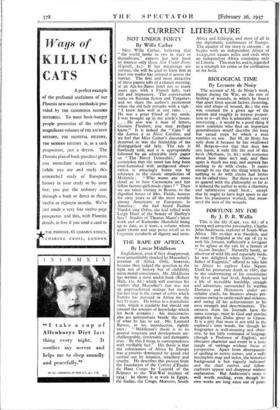CURRENT LITERATURE
Miss Willa Cather, believing that " the world broke in two in 1922 or thereabouts," expects her new book to interest only those Not Under Forty (Cassell, 5s.). If her misgivings are serious, she will be glad to learn that at least one reader has enjoyed it across the barrier. The first and most attractive of these papers tells of a chance meeting, at an Aix-les-Bains hotel not so many years ago, with a French lady, very old and impressive. The conversation turns on Russian fiction and Turgenev, and we share the author's excitement when the old lady remarks with a sigh : " I knew him well at one time. . . . He was a great friend of my uncle. I was brought up in my uncle's house. . . . He also was a man of letters, Gustave Flaubert, you may perhaps know." It is indeed the Cam ". of the Lettres a sa Niece Caroline, and we feel that Miss Cather's discernment deserved to win the friendship of the distinguished old lady. The tale is flawlessly told, and it is appropriately followed by an admirable little paper on " The Novel Demeuble," whose contention that the novel has long been over-furnished with undigested obser- vation is amusingly borne out by reference to the classic simplicities of Merimee : " Who wants any more detail as to how Carmencita and her fellow factory-girls made cigars ? " Then we are taken visiting in Boston, to the dignified house of Mrs. Fields, hostess for sixty years to all the most notable among Americans or Europeans in America : she had heard Pauline Viardot sing Orfeo, she had talked with Leigh Hunt of the beauty of Shelley's face ! Studies of Thomas Mann's latest work and of Katherine Mansfield bring up to date, as it were, a volume whose quiet charm and easy prose recall us to f)1-gotten standards of dignity and taste.


















































 Previous page
Previous page